-
Republicans agree to move quickly on emergency FEMA funds
Top Republican lawmakers say they will move quickly to pass President Obama’s request for emergency aid for victims of recent natural disasters like Hurricane Irene
-
-
Using breath and sweat to detect trapped disaster victims
Molecules in breath, sweat, and skin have been used by researchers to detect humans in a simulation of a collapsed building, offering the prospect of portable sensors for use in real-life situations, such as the devastating aftermath of devastating disasters
-
-
Most Americans unprepared for disaster, survey finds
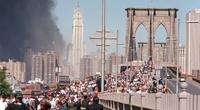
A new survey finds that most Americans are unprepared for major disasters and that they maintain a false sense of security with regard to what will happen if a major disaster or a terrorist attack took place; contrary to reality, almost one-third of respondents believed that during a major disaster, calling 911 would bring help within an hour, while 30 percent said they believed help would come within several hours
-
-
Disaster influences science fair entries
Science fair for school children in Christchurch, new Zealand see several earthquake- and flood-related inventions by junior high students; first prize went to a ninth grader who designed a possum trap to protect curious native weka from being poisoned during floods
-
-
Emergency communication remains a challenge ten years after 9/11
Chris Russo, a twenty-five year firefighting veteran, a 9/11 first responder, and the founder of ELERTS Corporation, discusses the challenges first responders face in communicating with each other in major disasters, the lack of progress made to create an inter-operable system for emergency responders, and how technology is changing how authorities communicate and interact with the public during major disasters
-
-
"No containment" for Texas wildfires

Currently there is no end in sight for the wildfires that are raging out of control in central Texas, despite the best efforts of firefighters to contain the conflagrations; “There’s no containment right now,” said the director of the Texas Forest Service; high winds from Tropical Storm Lee, a severe drought, and a lack of rain have fueled the fire and made it nearly impossible to control
-
-
Studying the effects of fire on steel structures, nuclear plants
Building fires may reach temperatures of 1,000 degrees Celsius, or more than 1,800 degrees Fahrenheit, and the strength of steel structures drops by about 40 percent when exposed to temperatures exceeding 500 degrees Celsius; scientists study precisely what happens to the connections between a floor’s steel beams and the building columns when these connections are exposed to intense heat
-
-
Earthquake moves Virginia nuclear waste casks
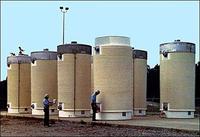
Last week’s earthquake saw caused nuclear waste casks to move up to four inches, and concrete pieces to peel off in concrete bunkers used for storing nuclear waste; the NRC says the casks and bunkers were not damaged, and no radiation leaked out
-
-
Teams dispatched to inspect Vermont nuclear plant following Irene
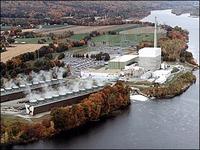
Following the torrential rains from Hurricane Irene on Sunday, federal officials have dispatched inspection teams to examine the aging Vermont Yankee nuclear plant to ensure that the plant has not been compromised; the plant has the same design as the Fukushima Daiichi plant in Japan which suffered a partial meltdown following the 11 March earthquake and tsunami
-
-
Automated flash-flood phone alert system developed
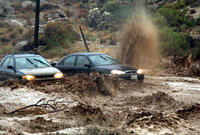
A part of Texas is called Flash Flood Alley because of the frequency and ferocity of flash floods; it stretches from San Antonio through Austin and to Dallas, and includes the Fort Hood military base; researchers develop a system which uses cell phones to give real-time text alerts of flash floods in the area
-
-
2011 disasters cause $55 billion in damages in U.S.
This year’ natural disasters could cost the United States as much as $55 billion; prior to Hurricane Irene, the National Oceanic and Atmospheric Administration’s National Climatic Data Center estimated that the nine major natural disasters to hit the United States earlier this year caused an estimated $35 million in damages
-
-
Insurance to cover little of Irene's damage
Hurricane Irene could be one of the ten costliest disasters in the history of the United States and since much of the damage was caused by flooding, insurance will cover little; in previous storms, insurance companies usually cover about half the total losses, but according to the Kinetic Analysis Corporation, insurers will likely cover less than 40 percent of costs
-
-
More than $70 million Irene damages in N.C., hits farmers hard
As North Carolina begins to recover from the deluge of rain and high winds of Hurricane Irene, Governor Beverly Perdue estimates that the storm caused more than $70 million in damages; Farmers near coastal areas were hit particularly hard with many reporting total losses
-
-
Hurricane's damage estimated at $7 billion
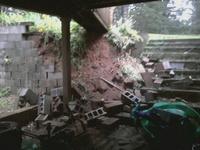
One private estimate put damage along the coast at $7 billion, far from any record for a natural disaster; most attention was paid to the shore during Irene’s slow ride up the East Coast, but it was inland — even hundreds of miles inland — that the storm’s most serious devastation actually occurred and most of the damage was done by water, not wind; the death toll climbed to thirty-five people in ten states after a number of bodies were pulled from the floodwaters in the Northeast
-
-
D.C. continues to struggle with orderly evacuations
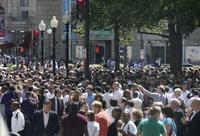
Last week’s earthquake that struck less than ninety miles outside of Washington, D.C. exposed the city’s continuing difficulties in effectively evacuating its residents; after the 5.9 magnitude earthquake struck the region, commuters were left stranded for hours as road traffic ground to a halt and trains became overcrowded and delayed due to speed restrictions because of the quake
-
- All
- Regional
- Water
- Biometrics
- Borders/Immig
- Business
- Cybersecurity
- Detection
- Disasters
- Government
- Infrastructure
- International
- Public health
- Public Safety
- Communication interoperabillity
- Emergency services
- Emergency medical services
- Fire
- First response
- IEDs
- Law Enforcement
- Law Enforcement Technology
- Military technology
- Nonlethal weapons
- Nuclear weapons
- Personal protection equipment
- Police
- Notification /alert systems
- Situational awareness
- Weapons systems
- Sci-Tech
- Sector Reports
- Surveillance
- Transportation
Advertising & Marketing: advertise@newswirepubs.com
Editorial: editor@newswirepubs.com
General: info@newswirepubs.com
2010-2011 © News Wire Publications, LLC News Wire Publications, LLC
220 Old Country Road | Suite 200 | Mineola | New York | 11501
Permissions and Policies
Editorial: editor@newswirepubs.com
General: info@newswirepubs.com
2010-2011 © News Wire Publications, LLC News Wire Publications, LLC
220 Old Country Road | Suite 200 | Mineola | New York | 11501
Permissions and Policies
